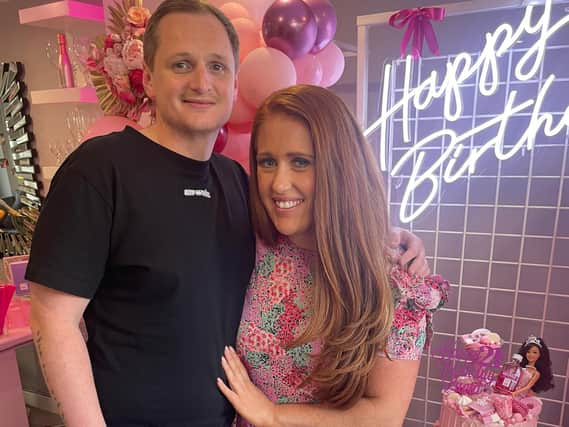Robotic operation first gives Poulton cancer patient back the opportunity for summer wedding


Paul Hutchinson is tying the knot with fiancée Lisa Bamforth at St John’s church in Poulton-le-Fylde on August 8 following the innovative procedure performed at Manchester’s internationally acclaimed cancer centre, The Christie.
The traditional treatment for his diagnosis of testicular cancer with spread to his abdominal lymph nodes would have involved major abdominal surgery necessitating intensive care, a seven-day stay in hospital and a recovery time at home of several months.
Advertisement
Hide AdAdvertisement
Hide AdPaul was considered a good candidate for the pioneering robotic treatment which involves keyhole surgery, directed by a surgeon and performed by
the intricate robotic machinery.
His hospital stay of just 48 hours will be followed by a recovery time of just a few weeks at home which Paul can use to prepare for the big day and celebrate with his fiancée and his two daughters Libbie and Lucie.
Paul said: “I didn’t think we could go ahead with the wedding as I was convinced I would not be well enough.
“The incredible robotic operation has dramatically reduced my recovery time and left me feeling fit and well.
Advertisement
Hide AdAdvertisement
Hide Ad“I was in the army when I was first diagnosed and staying fit has always been important to me. The robotic operation means I won’t be out of action for long and can get back to my job as an engineer at Amazon within weeks.
“I’ve also got the small matter of a wedding to attend to, too.”
Fiancée Lisa, a teacher at Blackpool and Fylde College, said she fought back the tears when the surgeon rang to tell her about the success of this pioneering procedure. “I am so relieved that Paul’s surgery is complete and that he had the opportunity to be treated in this incredible way.
“Paul continued to go for his check-up scans during Covid which was so important as the team were able to detect changes that needed addressing.
Advertisement
Hide AdAdvertisement
Hide Ad“The news that he needed this operation, after successfully undergoing chemotherapy and surgery in 2014, came out of the blue and we thought we would have to cancel the wedding again.
“This will be actually be our third attempt at getting married as Covid has played its part in us having to rearrange everything. It is going to be the most special day ever and can’t wait to celebrate at the reception with our family and friends at The Glass House in Staining.”
Aziz Gulamhusein, consultant urological and robotic surgeon at The Christie, said: “This was a first for The Christie as we engaged our state of the art robotic equipment to aid us with the precision required for an intricate procedure as needed for Paul’s cancer. To be involved in such a highly specialised
procedure using the latest technology is an amazing achievement for the team and the Trust, and most importantly will benefit Paul who can now enjoy his wedding day in just a few weeks’ time.”
Advertisement
Hide AdAdvertisement
Hide AdRetroperitoneal lymph node dissection for metastatic testicular cancer is a commonly performed procedure at The Christie. Due to the position of these lymph nodes deep within the abdomen, the operation is traditionally done via a large open incision with the associated side-effects.
The Christie has one of the largest robotic centres in the UK and the aim is to use that expertise to allow more patients to potentially undergo this minimally invasive surgery to treat metastatic testicular cancer. The robot offers a highly magnified, 3D view with intricate instrument dexterity to ensure careful removal of cancerous nodes whilst preserving nerves and offering an enhanced recovery with much shorter convalescence.